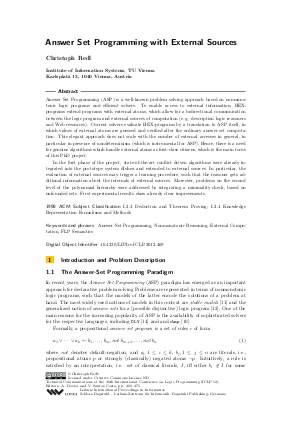Answer Set Programming with External Sources
Author Christoph Redl
-
Part of:
Volume:
Technical Communications of the 28th International Conference on Logic Programming (ICLP'12) (ICLP 2012)
Part of: Series: Leibniz International Proceedings in Informatics (LIPIcs)
Part of: Conference: International Conference on Logic Programming (ICLP) - License:
 Creative Commons Attribution-NoDerivs 3.0 Unported license
Creative Commons Attribution-NoDerivs 3.0 Unported license
- Publication Date: 2012-09-05
File

PDF
LIPIcs.ICLP.2012.469.pdf
- Filesize: 283 kB
- 7 pages
Document Identifiers
Subject Classification
Keywords
- Answer Set Programming
- Nonmonotonic Reasoning
- External Computation
- FLP Semantics
Metrics
- Access Statistics
-
Total Accesses (updated on a weekly basis)
0PDF Downloads0Metadata Views
Abstract
Answer Set Programming (ASP) is a well-known problem solving approach based on nonmonotonic logic programs and efficient solvers. To enable access to external information, HEX-programs extend programs with external atoms, which allow for a bidirectional communication between the logic program and external sources of computation (e.g., description logic reasoners and Web resources). Current solvers evaluate HEX-programs by a translation to ASP itself, in which values of external atoms are guessed and verified after the ordinary answer set computation. This elegant approach does not scale with the number of external accesses in general, in particular in presence of nondeterminism (which is instrumental for ASP). Hence, there is a need for genuine algorithms which handle external atoms as first-class citizens, which is the main focus of this PhD project. In the first phase of the project, state-of-the-art conflict driven algorithms were already integrated into the prototype system dlvhex and extended to external sources. In particular, the evaluation of external sources may trigger a learning procedure, such that the reasoner gets additional information about the internals of external sources. Moreover, problems on the second level of the polynomial hierarchy were addressed by integrating a minimality check, based on unfounded sets. First experimental results show already clear improvements.
Cite As Get BibTex
Christoph Redl. Answer Set Programming with External Sources. In Technical Communications of the 28th International Conference on Logic Programming (ICLP'12). Leibniz International Proceedings in Informatics (LIPIcs), Volume 17, pp. 469-475, Schloss Dagstuhl – Leibniz-Zentrum für Informatik (2012)
https://doi.org/10.4230/LIPIcs.ICLP.2012.469
BibTex
@InProceedings{redl:LIPIcs.ICLP.2012.469,
author = {Redl, Christoph},
title = {{Answer Set Programming with External Sources}},
booktitle = {Technical Communications of the 28th International Conference on Logic Programming (ICLP'12)},
pages = {469--475},
series = {Leibniz International Proceedings in Informatics (LIPIcs)},
ISBN = {978-3-939897-43-9},
ISSN = {1868-8969},
year = {2012},
volume = {17},
editor = {Dovier, Agostino and Santos Costa, V{\'\i}tor},
publisher = {Schloss Dagstuhl -- Leibniz-Zentrum f{\"u}r Informatik},
address = {Dagstuhl, Germany},
URL = {https://drops.dagstuhl.de/entities/document/10.4230/LIPIcs.ICLP.2012.469},
URN = {urn:nbn:de:0030-drops-36489},
doi = {10.4230/LIPIcs.ICLP.2012.469},
annote = {Keywords: Answer Set Programming, Nonmonotonic Reasoning, External Computation, FLP Semantics}
}
